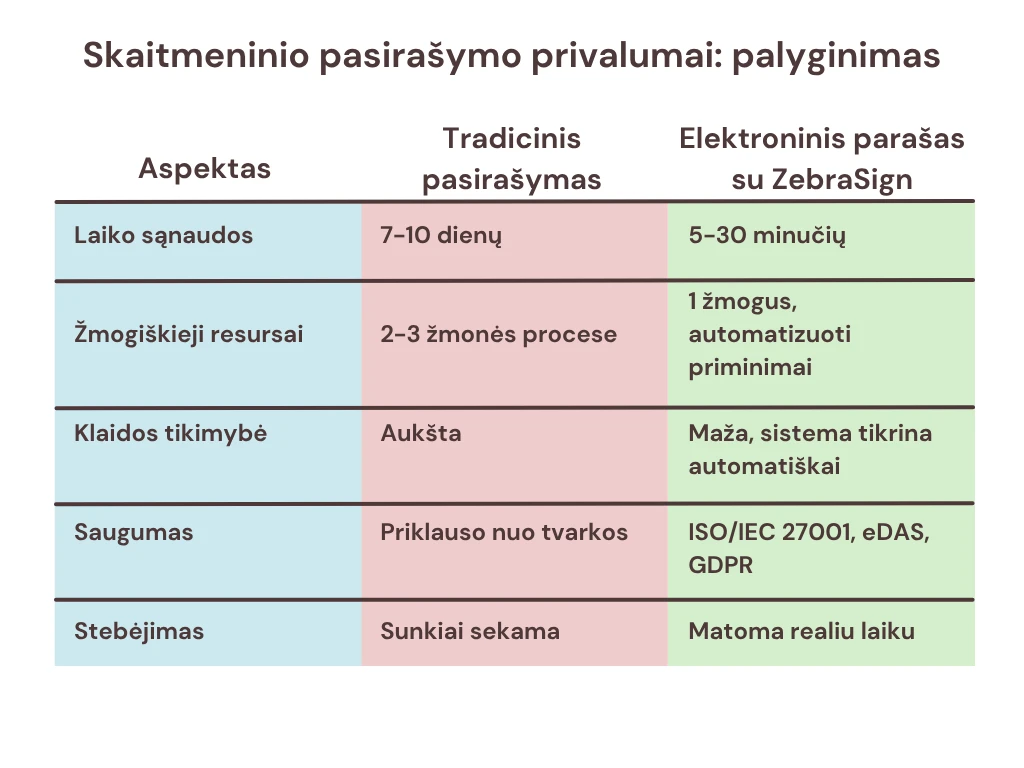Elektroninis parašas per pastaruosius metus tapo kasdieniu sprendimu daugelyje Lietuvos įmonių. Tačiau tik tie, kurie yra patyrę tradicinio dokumentų pasirašymo procesus, iš tiesų supranta, kiek daug laiko ir pastangų šis pokytis sutaupo.
Daugelio Lietuvos įmonių kasdienybė dar visai neseniai atrodė taip: kiekviena sutartis ar dokumentas virsdavo fiziniais lapais, kuriuos reikėjo atspausdinti, pasirašyti ranka, perduoti vadovui, o tuomet – išsiųsti partneriams paštu ar per kurjerį. Buhalterės, administracijos darbuotojai ir vadovai didelę dalį savo laiko skirdavo ne strateginiam darbui, o rutinoms – dokumentų spausdinimui, pasirašymui, siuntimui, priminimams kolegoms ir partneriams. Vienas grandinės narys, išvykęs į komandiruotę ar tiesiog pamiršęs pasirašyti, galėjo sustabdyti visą procesą. Dokumentų pasirašymas dažnai užtrukdavo ne dienas, o savaites, o kiekviena uždelsta sutartis reiškė prarastas galimybes ir papildomą stresą.
Popierinis dokumentų pasirašymas buvo ne tik lėtas ir neefektyvus, bet ir kėlė papildomų rizikų – nuo žmogiškųjų klaidų iki prarastų galimybių bei didesnių veiklos sąnaudų.
Elektroninio parašo diegimas Lietuvos organizacijose jau tapo plačiai paplitusia praktika, kurią lydi aiškiai išmatuojama nauda. Įmonės, kurios anksčiau rėmėsi popieriniais dokumentais, pastebi, kad pasirašymo laikas sutrumpėjo nuo kelių dienų ar net savaičių iki kelių minučių. Administracijos ir finansų skyriai, kurie didelę dalį darbo laiko skirdavo dokumentų spausdinimui, siuntimui, sekimui ar archyvavimui, dabar visus šiuos žingsnius atlieka vienoje skaitmeninėje sistemoje.
Organizacijos, veikiančios keliuose miestuose arba turinčios nuotoliniu būdu dirbančių darbuotojų, ypač vertina galimybę pasirašyti dokumentus be fizinio susitikimo ar popierinių originalų siuntimo. Elektroninis parašas leidžia išvengti vėlavimų, kuriuos anksčiau sukeldavo prarasti ar užstrigę dokumentai. Dėl to komandos gali greičiau susitarti ir užbaigti svarbius sandorius ar vidaus procesus – dažnai tą pačią dieną.
Reguliuojamuose sektoriuose, tokiuose kaip sveikatos apsauga ar logistika, elektroninis parašas užtikrina, kad visi dokumentai būtų tvarkomi pagal teisės aktus (eIDAS, GDPR, ISO/IEC 27001). Galimybė realiu laiku stebėti pasirašymo eigą suteikia daugiau skaidrumo, o automatizuoti priminimai sumažina riziką, kad kuris nors parašas bus pamirštas.
Elektroninis parašas suteikia daugiau kontrolės dokumentų valdyme bei iš esmės keičia darbo kultūrą organizacijoje – procesai skaidrūs, atsekami ir pilnai kontroliuojami. Elektroninis parašas leidžia įmonėms dirbti greičiau, taupyti išlaidas, užtikrinti atitiktį ir centralizuotai valdyti dokumentų srautus. Šie rezultatai jau tapo nauju standartu tarp Lietuvos įmonių, kurios pasirinko skaitmenizuoti dokumentų valdymą ir naudotis elektroniniu parašu.

Taip, ZebraSign atitinka visus aukščiausius saugumo standartus (ISO/IEC 27001, eIDAS, GDPR).
ZebraSign neapsiriboja tik parašu – tai pilnas elektroninių dokumentų valdymo įrankis. Platforma leidžia ne tik pasirašyti, bet ir automatizuoti visą dokumentų valdymą: kurti, tvarkyti, grupuoti, nustatyti pasirašymo eiliškumą, naudotis šablonais, sekti pasirašymo eigą realiu laiku ir integruoti su kitomis verslo sistemomis. Tai ypač vertina logistikos, sveikatos apsaugos ir kiti sektoriai, kuriems svarbus sklandus dokumentų judėjimas.
Registracija trunka vos kelias minutes. Platforma veikia naršyklėje, o pasirašyti galima ir mobiliuoju įrenginiu ar kompiuteriu. ZebraSign Signature Pad programėlės pasiekiamos Google Play ir Apple App Store, o ZebraSign Printer – Windows ir MacOS sistemoms.
Elektroninis parašas – tai ne tik technologinis sprendimas, bet ir reali pagalba kasdieniuose darbuose. Šiuolaikinės įmonės, pasirinkusios ZebraSign sprendimą, išvengia vėlavimų, klaidų ir popierizmo, o darbuotojai gali daugiau laiko skirti svarbioms užduotims. Elektroninis pasirašymas leidžia visiems dirbti greičiau, saugiau ir patogiau – o tai šiandien yra tikra vertybė. Norite sužinoti daugiau? Apsilankykite zebrasign.com arba susisiekite konsultacijai – padėsime skaitmenizuoti Jūsų dokumentų pasirašymą.
Norite būti visada informuoti? Užsisakykite mūsų naujienlaiškį ir gaukite naujausią informaciją tiesiai į savo pašto dėžutę. Išskirtiniai straipsniai, aktualijos ir svarbiausios naujienos laukia Jūsų! Prenumeruokite dabar ir nepraleiskite svarbiausių įvykių!